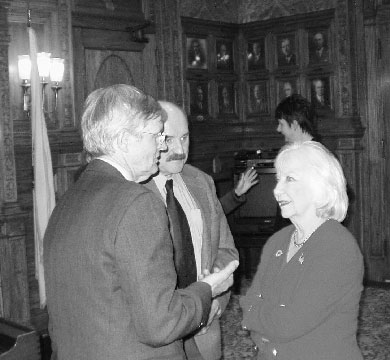After Gora, Legislative Outreach Continues

Provost Paul Fonteyn, Dean Edmund Beard, and state Senator Jo Ann Sprague
November 12, 2004
At a quiet reception in his office last January State Senator Robert Travaligni was presented with a surprise from Chancellor Jo Ann Gora and UMass President Jack Wilson: an honorary degree.
Travaligni, a Democrat who represents parts of Boston, Cambridge, and Revere, beamed while holding his new honorary degree. An alumnus of Boston State, before it merged with UMass Boston twenty years ago, he is one of a quarter of a million UMass alumni spread out across the state, fifty of which serve in the state Legislature and many of whom were present that evening.
“It’s easy to say we probably touch each member of the Legislature in some shape or form,” said Kenneth Lemanski, associate chancellor and a former state legislator.
But the relationship with the Legislature, with the Boston delegation in particular, has not always been as warm as it was that night in Travaligni’s office. The Legislature has had a history of erratic appropriations to the university and its budget, with the university system benefiting in the good fiscal periods, and in other periods becoming wounded by severe cuts.
On the Boston campus the relationship was, at times, not as strong as it could have been, some say. A few senior administration officials, who cite ex-Chancellor Gora’s strengths in other campus areas, now say that her relationship with the Legislature was one of her weaknesses.
Other top university officials disagree. “I would say her relationship overall was a good one,” said Annemarie Lewis Kerwin, vice chancellor for University Communications & Community Relations. Gora, who left for the presidency at Ball State University after three years at the helm of UMass Boston, had a very good working relationship with House Speaker Thomas Finneran and Travaligni, she said, adding that before Travaligni took the position, she and Gora went up to Beacon Hill to talk to him about ways they could work together. With the January reception, “He was very happy to do that,” said Kerwin, who accompanied Gora to most of the meetings on Beacon Hill. “That was her idea.”
But in the beginning, the relationship did not appear to get off to a great start. When she first arrived, then-Senate President Thomas Birmingham did not return her phone calls. His wife, Selma Botman, then-UMass vice president of academic affairs, had been up for the job of chancellor along with Gora. University officials contend that he was busy running for governor at the time.
Then came the budget cuts of nearly $30 million, leading Gora to create a cost-slashing Committee on University Resources and Expenditure (CURE). Gora also had gotten rid of budget earmarks for the various campus institutes, which had been created years ago by the Legislature.
A backlash erupted from some corners on campus, who felt they were being cut disproportionately. Among them were the institutes, which maintain their strong ties to friends in the Legislature. Gora and other administration officials wanted the institutes’ budgets under the control of the university, but institute officials say the earmarks are in place precisely in order to keep administrators from attempting to cut them. Administrators reportedly encouraged the institutes to call the Legislature and tell them no money was needed. But much like when Chancellor Sherry Penney had attempted during her tenure, legislators later inserted the earmarks back into the budget.
Lemanski, who joined the administration last December after stints at UMass Lowell and the President’s Office, said that earmarks are given by legislatures to placate individual members or groups of members’ interest in a particular area and can restrict administrators and their budgets.
“What has always been identified as a negative effect of those earmarks by UMass administrators – whether they’re campus administrators or system administrators – is that when money is earmarked, and the appropriation isn’t given, it ties the hand of the administrators as to how the money should be used,” he said. “And it’s most acute at times when a state budget appropriation to the university is limited or is cut.”
But Gora critics point to the institutes’ cuts as another example of Gora’s alleged lack of political astuteness. As one professor put it, writing in an e-mail on the condition of anonymity earlier this year, “She doesn’t seem to know how to handle the political complexities of being chancellor of a public university in Massachusetts. Our Chancellor shouldn’t make a pattern of regularly offending all our local political leaders, as if they have no stake in our campus. UMB is not a private corporation, and she is not just its ‘CEO.'”
What appeared to do the most damage by far was the push for student housing, which Gora pursued even after members of the Legislature told her to drop the issue. Dorms, after local community outcry, were finally put on the backburner last year after then-UMass President William Bulger was forced to take dorms off of a construction bond request. Bulger resigned months later, forced out by Gov. Mitt Romney. “She did have a strained relationship,” with some in the legislature, primarily because of dorms, said David MacKenzie, former vice chancellor of administration and finance and current head of the UMass Building Authority.
“Clearly the residential housing issue was a divisive one,” and one that dominated her administration, Kerwin said. There were times, without question, when some members of the Boston delegation didn’t see eye to eye with her on that issue, she said, but the relationships, overall, were good.
Gora, who would go up to the State House three to four times a month, made an effort to tell the UMass story, she said, citing a forum Gora was at with Gov. Romney, who started to mention all the campuses, but nothing came to mind with UMass Boston.
“That oversight was not lost on her,” she said, adding that Gora then made pamphlets and brochures to fill the void of information on the campus on Beacon Hill.
Establishing a solid relationship with the state Legislature will remain a challenge for the next chancellor, particularly if he or she is an outsider, like Gora was coming from Virginia’s Old Dominion University.
It remains one of the advantages that Interim Chancellor Keith Motley, a prospective candidate for the permanent position, appears to hold as an incumbent and as someone with strong ties in the community, forged while he was an administrator at Northeastern University.
He has longstanding relationships with many of people who serve in the State House, telling the Dorchester Reporter in an interview several months ago, “When I walk into the State House, I’m surprised to see who’s there: former students of mine, former colleagues of mine, people whose campaigns I worked on as a youngster, so on and so forth. People who tell me, ‘Come down, you can use my office.'”
“You can’t get that in three years,” Kerwin said. “He’s a likable guy. That’s not to say Dr. Gora wasn’t. He knows the city, he knows the state.”
Others, among the Gora critics, have called Motley a “fresh change.” “It’s a welcome relief,” said one institute member. “His outreach to the institutes has been very strong.”
Whoever the next chancellor is, even greater outreach to the Legislature started under Gora can be expected, administration officials say. “The Boston campus needs to engage on a more regular basis with the members of the Legislature who are most concerned with what we do and who we serve,” Lemanski said. “And I think that the secret to that is getting them to know us better in a lot of different ways.”






















































